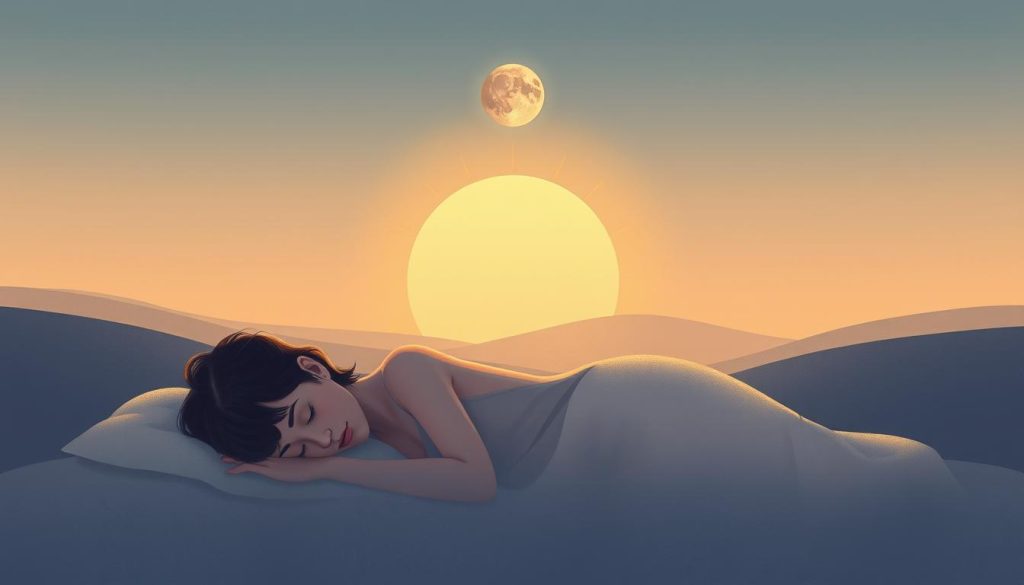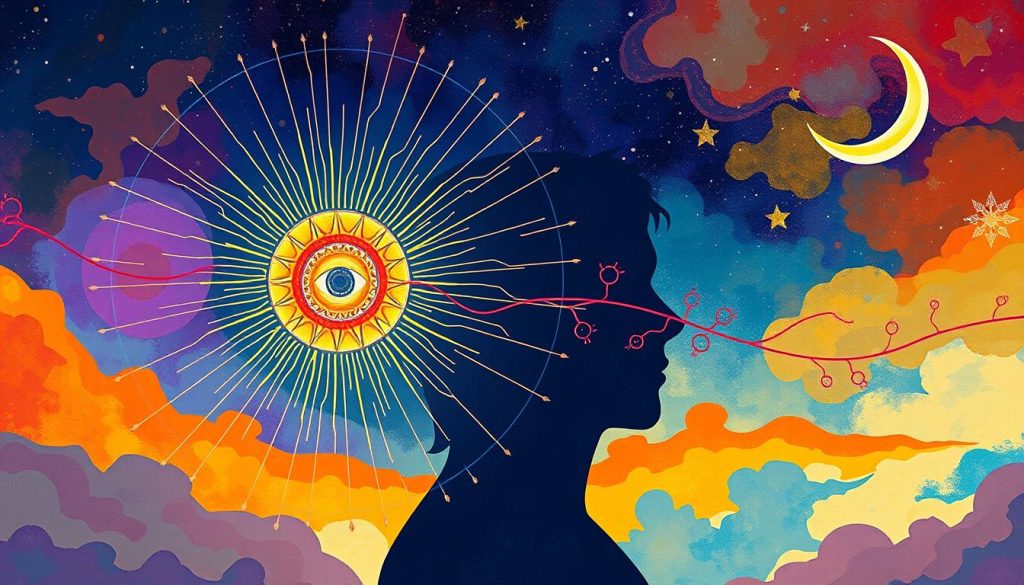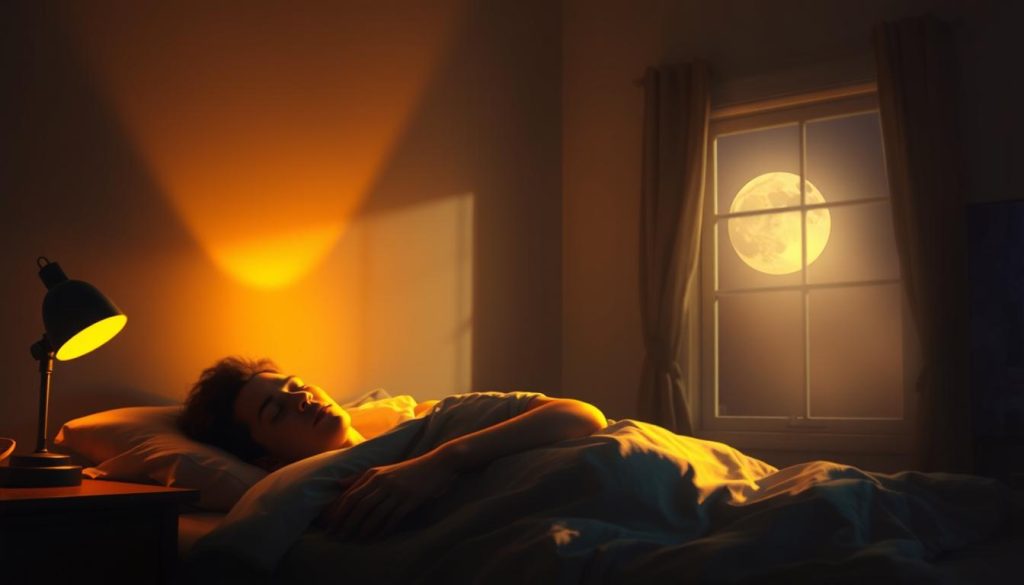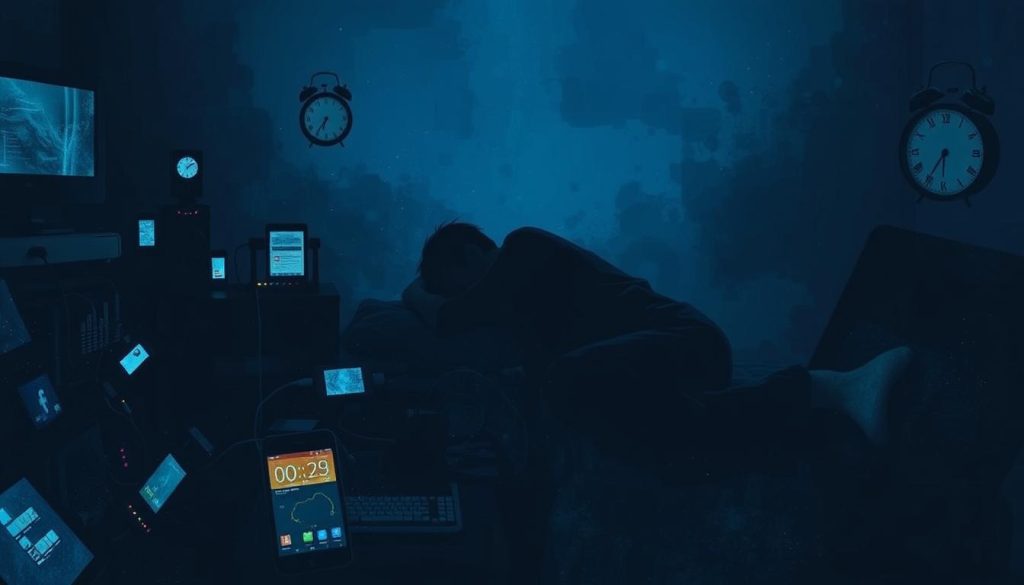Your body has an internal clock that follows natural daylight patterns all year. This clock, called your circadian rhythm, tells you when to be awake, sleepy, hungry, and full of energy. When daylight changes with the seasons, your clock must adjust too.
Many people feel different in winter than in summer. You might find it hard to wake up when it’s dark or feel very tired in the afternoon. These feelings aren’t because you’re weak or lazy. They’re your body’s normal response to the changing daylight.
Knowing how seasonal light and your circadian rhythm interact helps explain why your energy changes. Summer days are long, while winter afternoons are short. Your brain uses these changes to adjust your sleep and wake times.
Understanding these natural processes helps you work with your body, not against it. This knowledge is key to managing health challenges that come with the seasons.
Understanding Circadian Rhythm
Your body has a built-in timing system that controls your daily life. It tells you when to be alert, hungry, and ready for sleep. The study of chronobiology shows how vital this internal clock is.
Think of your circadian rhythm as a conductor leading an orchestra. It makes sure each part of your body works at the right time.

What Is Circadian Rhythm?
Circadian rhythm is your body’s 24-hour clock. It controls your sleep-wake cycle and other body processes. It’s located in a small part of your brain called the suprachiasmatic nucleus.
This clock doesn’t just decide when you’re tired or awake. It also manages hormone production, body temperature, digestion, immune responses, and blood pressure.
Your circadian rhythm works even without outside help. But it needs light to stay in sync with the world. This helps your body get ready for the day and night.
Chronobiology shows it’s more than just feeling tired at night. Your internal clock helps with cell repair, memory, and nutrient processing.
Importance of Circadian Rhythm for Health
Keeping a healthy sleep-wake cycle is key for your health. A well-working internal clock supports your body in many ways.
A good internal clock helps your body make the right hormones at the right time. For example, it makes you wake up in the morning and feel sleepy at night.
But, problems with your circadian rhythm can cause serious health issues:
- More depression and anxiety
- Weight gain and metabolic problems
- Weakened immune system
- Memory and cognitive problems
- Higher risk of chronic diseases
Studies show people with irregular sleep patterns face more health problems. Your body likes predictability. Respecting your natural timing is key for health and energy.
Knowing about your circadian rhythm helps you work with your body. This is especially important when light changes with the seasons.
The Role of Light in Regulating Circadian Rhythm
Light is nature’s most powerful timekeeper. It helps our internal biological clock stay in sync with the Earth’s 24-hour cycle. Scientists call these cues “zeitgebers,” meaning “time-givers” in German.
Knowing how light affects our circadian rhythm helps us make better choices. The right light at the right time supports our natural sleep-wake cycle. But, poor light patterns can mess up our internal clock.

How Light Affects Our Biological Clock
Your eyes have special cells that detect light and send signals to your brain. This process, called photic entrainment, happens automatically. These cells are very sensitive to blue light, found in morning sunlight.
Morning light triggers a series of biological responses. It reduces melatonin production, making you feel less sleepy. At the same time, it increases cortisol levels, making you feel alert and energized.
As evening comes, your biological clock responds. The lack of bright light signals your brain to start making melatonin again. This natural rhythm helped our ancestors stay active during the day and rest at night.
The timing of light exposure is crucial. Getting bright light in the morning resets your circadian rhythm. But, bright light in the evening can delay your bedtime and disrupt sleep quality.
Different Types of Light and Their Effects
Natural sunlight is the best zeitgeber for healthy circadian rhythms. It has the full spectrum of light wavelengths, changing throughout the day. Morning sunlight is rich in blue light, while evening light is warmer and redder.
Artificial lighting can also affect your biological clock, but not all light is equal. The color temperature of light, measured in Kelvin, affects your circadian system. Cool, blue-rich light promotes alertness, while warm, amber light has little effect on melatonin production.
Blue light is especially important because of its strong effects on photic entrainment. While blue light from screens and LED bulbs is helpful during the day, it’s problematic in the evening. Exposure to blue light from devices within two hours of bedtime can delay sleep onset.
The intensity of light exposure is also key. Bright light of 10,000 lux or more can effectively reset your circadian rhythm. In contrast, typical indoor lighting provides only 100-500 lux, which may not be enough, especially in darker months.
Seasonal Changes in Light Exposure
Seasonal changes in light exposure trigger automatic adjustments in our circadian rhythm. This natural process, known as photoperiodism, helps our bodies adapt to changing daylight patterns throughout the year. Understanding how these seasonal shifts affect us can help you work with your body’s natural rhythms rather than against them.
Your biological clock responds to these seasonal changes in predictable ways. The amount and timing of light exposure directly influence your phase response curve. This curve determines when you feel alert or sleepy. These adaptations are completely normal and represent your body’s intelligent response to environmental changes.

The Impact of Longer Days in Summer
Summer’s extended daylight hours create energizing effects that many people find invigorating. The increased light exposure naturally shifts your phase response curve. This makes you want to stay up later and wake up earlier.
However, these longer days can present some challenges. The bright evening light can make it difficult to wind down at your usual bedtime. Your body may resist sleep when natural light signals suggest it’s still daytime.
Here are the main effects of summer’s longer days:
- Increased energy levels and alertness
- Natural tendency to stay up later
- Reduced sleep duration needs
- Enhanced mood and motivation
- Difficulty winding down in bright evening light
Effects of Shorter Days in Winter
Winter’s shorter days and reduced light intensity create different but equally normal responses in your body. Many people experience decreased energy, mood changes, and increased sleep needs during darker months. This photoperiodism response is your body’s way of conserving energy when daylight is scarce.
The reduced light exposure can lead to delayed sleep phases. You might find yourself wanting to sleep later in the morning and feeling drowsy earlier in the evening. These changes reflect your circadian rhythm’s natural adaptation to winter conditions.
Common winter light exposure effects include:
- Lower energy levels throughout the day
- Increased sleep duration needs
- Delayed morning alertness
- Earlier evening drowsiness
- Seasonal mood variations
Remember that these seasonal responses are normal biological adaptations, not personal failings. Your body is simply responding to environmental cues that have guided human behavior for millennia. Working with these natural rhythms, rather than fighting them, can help you maintain better health and well-being throughout the year.
Disruptions to Circadian Rhythm
Our bodies have a natural timing system, but many things can upset it. In today’s world, this is more common than ever. Knowing what affects our biological clock helps us stay healthy.
Our lives often clash with our natural sleep patterns. Many face situations that mess with their body’s timing. The first step to fixing this is to know what disrupts our rhythm.
Common Causes of Disruption
Many daily activities can mess with our body’s timing. Shift work is a big problem, making it hard to sleep when we should. People working at night often struggle to keep a regular sleep schedule.
Traveling across time zones is another big challenge. Jet lag happens when our body clock doesn’t match the local time. It can take days to adjust, depending on how many time zones you cross.

Screen time in the evening is also a concern. The blue light from screens can stop our body from making melatonin. This makes it harder to fall asleep at night.
Irregular sleep times mess with our body’s timing. Sleeping at different times each day confuses our body. Even weekend sleep-ins can throw off our rhythm.
Not getting enough morning light is another problem. Many spend mornings indoors, missing out on natural light. This confuses our body about when the day starts.
Seasonal changes can also upset our rhythm. As daylight hours change, our bodies need time to adjust. Some find it harder to adapt to these changes than others.
Consequences of Circadian Misalignment
When our rhythm is off, melatonin production suffers. This hormone tells our body when it’s time to sleep. Poor melatonin leads to trouble falling and staying asleep.
Bad sleep quality follows when our body clock is off. People might have trouble sleeping deeply and wake up often. These problems can lead to other health issues.
Mood problems also arise from disrupted rhythms. Many feel more irritable, anxious, and stressed. Sleep timing and mood are closely linked.
Our immune system also suffers when our rhythm is off. Our body needs proper sleep to fight off illnesses. Disrupted melatonin can weaken our immune system over time.
Long-term rhythm problems can lead to serious health issues. Research shows links to depression, seasonal affective disorder, and other problems. Metabolic and heart health can also be at risk.
The good news is small improvements can make a big difference. Knowing what disrupts our rhythm helps us make better choices. Every step towards better timing supports our health.
Tips for Optimizing Light Exposure
Managing your light exposure can greatly improve your circadian rhythm and well-being. Small, consistent changes can make a big difference. They help your body adapt to seasonal changes.
Best Practices for Seasonal Adaptation
Start your day with bright morning light, especially in winter. Take a short walk outside or eat breakfast near a large window. This natural light helps reset your internal clock every day.
In summer evenings, gradually reduce light intensity as bedtime nears. Use blackout curtains to create a dark sleep environment. Keep consistent sleep and wake times all year, even when daylight hours change a lot.
Create an evening routine that limits blue light from screens at least an hour before bed. Dim your home lighting as the evening goes on. This signals your body that it’s time to sleep.
Technology and Tools to Help Regulate Circadian Rhythm
Light therapy boxes can help during darker winter months. Use them for 20-30 minutes each morning while having coffee or reading.
Blue light filtering glasses reduce evening screen exposure. Many smartphones have built-in blue light filters that adjust screen color temperature throughout the day.
Apps like f.lux or Night Shift can warm your screen colors as evening approaches. These tools work best when used with good natural light habits, not as a replacement.

